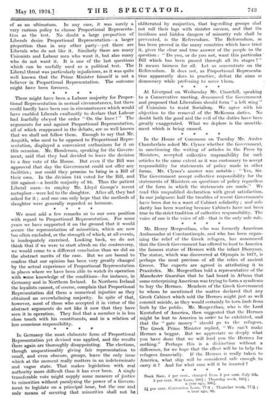We must add a few remarks as to our own
position with regard to Proportional Representation. For some years we have supported it on the ground that it would secure the representation of minorities, which are now too often excluded, or the strength of which, at all events, is inadequately exercised. Looking back, we do not think that if we were to start afresh on the controversy, we would come to a different conclusion than we did on the abstract merits of the case. But we are bound to confess that our opinion has been very greatly changed by the actual experience of Proportional Representation in places where we have been able to watch its operation with some knowledge of the conditions—for instance, in Germany and in Northern Ireland. In Northern Ireland the loyalists cannot, of course, complain that Proportional Representation did them a numerical injustice as they obtained an overwhelming majority. In spite of that, however, most of those who accepted it in virtue of the abstract arguments do not like it now that they have seen it in operation. They find that a member is in less close touch with his constituents, and in a relation of less conscious responsibility. * * * *






































 Previous page
Previous page